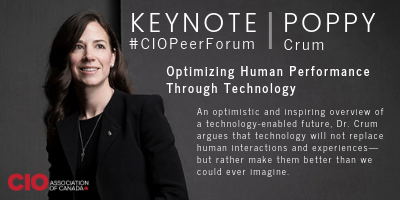By: Atamjeet Kaur
Dr. Poppy Crum, Chief Scientist at Dolby Laboratories, left the audience awestruck in the opening keynote session on day 2 of CIOCAN conference held in Toronto, Ontario. She mentioned how at the core; our human experiences are vastly different based on information available to us as per the environment we live in. Based on environments, different information is perceived differently by humans that translates their success in their respective environments.
She explains this by citing great example from Wilder Penfield, an American-Canadian neurosurgeon, who used to ask his patients for their permission to also study certain areas of their brain for his research purpose before performing surgery on patients suffering from epilepsy. For instance, how the operational resources of brain were distributed for sensations and voluntary functions performed by body parts. His discovery shows a distorted view of human body commonly known as Cortical Homunculus which has extra large hands and lips in a 3-D representation of the human body. Our body has most feelings or sensations in these parts where brain issues dedicated number of neurons.
We tend to think of human brain as stable which it seems not, instead our brain goes through various changes during lifetime which is called Neuroplasticity that controls sensitivity in human body.
Dr. Crum highlights that we as humans keep poker face and want cognitive control of what, how and who we want to share our actual emotions with. Technology can know and already knows a lot about humans in terms of emotions, convenience, capability, accessibility etc. and how we are going to interact with our personal data. Technology targeted neuroplasticity will make us faster, recover more rapidly, hear more accurately, see more sharply and even think more effectively.
Empathetic technology will transform relationships we have with each other and the spaces we work at, live in, train and heal. She then goes on to say that devices will know more about us than we do which means we design for intent, i.e. design and build technology that is fit for specific purpose. At the same time, one size technology that will fit all purpose would be a thing of the past and it would be designed in future to control human experiences by intent. For example, devices/ technology around us would be able to know about diseases which we may suffer from even in future. If designed with the specific purpose, it would also be able to help humans make better interpersonal connections with each other.
She continues to add that when technology is all around us, hearing and observing us round the clock, is it worth it? When build to achieve certain purpose, increased tracking of our lives and surroundings and ubiquitous sensing by technology can also mean greater autonomy and freedom. Freedom to use technology to meet specific needs, for example, where humans can use it to achieve their greatest potential and performance, can be used in customer service-based industry including better healthcare system.
So, technology enabled future can help improve human interactions, experiences and needs better aligned with our environment for enhanced capabilities of human body and minds.
About the writer:
 Atamjeet Kaur is project management professional with over decade of successful experience while working in various industries. She has completed her Masters in Computer Science and holds multiple professional credentials as PMP, ITIL and Six-Sigma Green Belt. She is owner of her own consulting corporation providing project management and business consulting services to both Canada and US based organizations. She is member of Project Management Institute and active volunteer for PMI chapters where she had facilitated PMP exam prep courses and been session host for professional development conference amongst others. In her free time, she enjoys playing badminton and gardening.
Atamjeet Kaur is project management professional with over decade of successful experience while working in various industries. She has completed her Masters in Computer Science and holds multiple professional credentials as PMP, ITIL and Six-Sigma Green Belt. She is owner of her own consulting corporation providing project management and business consulting services to both Canada and US based organizations. She is member of Project Management Institute and active volunteer for PMI chapters where she had facilitated PMP exam prep courses and been session host for professional development conference amongst others. In her free time, she enjoys playing badminton and gardening.
You can connect with Atamjeet on LinkedIn here.
